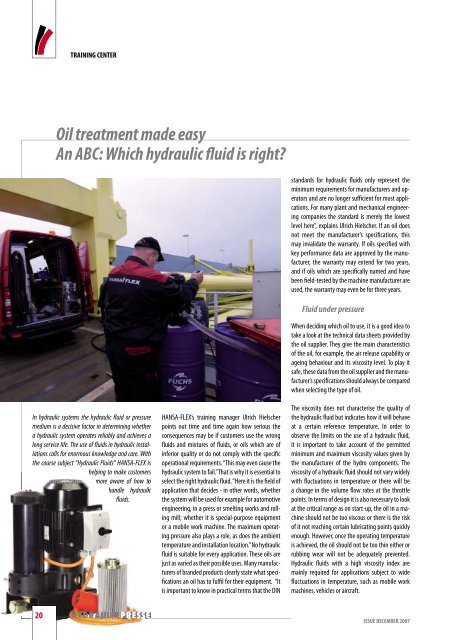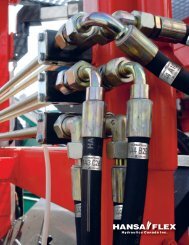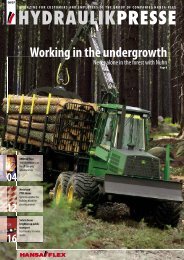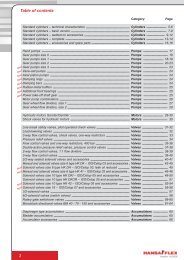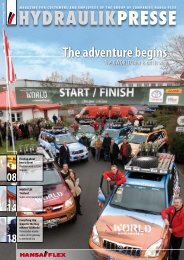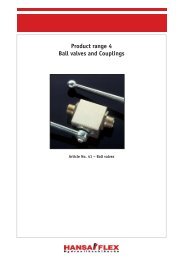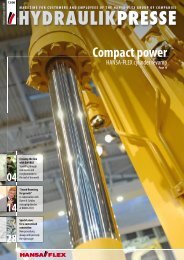HYDRAULIKPRESSE - HANSA-FLEX Hydraulics Canada Inc.
HYDRAULIKPRESSE - HANSA-FLEX Hydraulics Canada Inc.
HYDRAULIKPRESSE - HANSA-FLEX Hydraulics Canada Inc.
You also want an ePaper? Increase the reach of your titles
YUMPU automatically turns print PDFs into web optimized ePapers that Google loves.
TRAINING CENTER<br />
In hydraulic systems the hydraulic fl uid or pressure<br />
medium is a decisive factor in determining whether<br />
a hydraulic system operates reliably and achieves a<br />
long service life. The use of fl uids in hydraulic installations<br />
calls for enormous knowledge and care. With<br />
the course subject “Hydraulic Fluids” <strong>HANSA</strong>-<strong>FLEX</strong> is<br />
helping to make customer customers<br />
more aware of how to<br />
handle hydraulic hydrauli<br />
fl uids.<br />
20<br />
Oil treatment made easy<br />
An ABC: Which hydraulic fl uid is right?<br />
<strong>HYDRAULIKPRESSE</strong><br />
<strong>HANSA</strong>-<strong>FLEX</strong>’s training manager Ulrich Hielscher<br />
points out time and time again how serious the<br />
consequences may be if customers use the wrong<br />
fl uids and mixtures of fl uids, or oils which are of<br />
inferior quality or do not comply with the specifi c<br />
operational requirements. “This may even cause the<br />
hydraulic system to fail.” That is why it is essential to<br />
select the right hydraulic fl uid. “Here it is the fi eld of<br />
application that decides - in other words, whether<br />
the system will be used for example for automotive<br />
engineering, in a press or smelting works and rolling<br />
mill; whether it is special-purpose equipment<br />
or a mobile work machine. The maximum operating<br />
pressure also plays a role, as does the ambient<br />
temperature and installation location.” No hydraulic<br />
fl uid is suitable for every application. These oils are<br />
just as varied as their possible uses. Many manufacturers<br />
of branded products clearly state what specifi<br />
cations an oil has to fulfi l for their equipment. “It<br />
is important to know in practical terms that the DIN<br />
standards for hydraulic fl uids only represent the<br />
minimum requirements for manufacturers and operators<br />
and are no longer suffi cient for most applications.<br />
For many plant and mechanical engineering<br />
companies the standard is merely the lowest<br />
level here”, explains Ulrich Hielscher. If an oil does<br />
not meet the manufacturer’s specifi cations, this<br />
may invalidate the warranty. If oils specifi ed with<br />
key performance data are approved by the manufacturer,<br />
the warranty may extend for two years,<br />
and if oils which are specifi cally named and have<br />
been fi eld-tested by the machine manufacturer are<br />
used, the warranty may even be for three years.<br />
Fluid under pressure<br />
When deciding which oil to use, it is a good idea to<br />
take a look at the technical data sheets provided by<br />
the oil supplier. They give the main characteristics<br />
of the oil, for example, the air release capability or<br />
ageing behaviour and its viscosity level. To play it<br />
safe, these data from the oil supplier and the manufacturer’s<br />
specifi cations should always be compared<br />
when selecting the type of oil.<br />
The viscosity does not characterise the quality of<br />
the hydraulic fl uid but indicates how it will behave<br />
at a certain reference temperature. In order to<br />
observe the limits on the use of a hydraulic fl uid,<br />
it is important to take account of the permitted<br />
minimum and maximum viscosity values given by<br />
the manufacturer of the hydro components. The<br />
viscosity of a hydraulic fl uid should not vary widely<br />
with fl uctuations in temperature or there will be<br />
a change in the volume fl ow rates at the throttle<br />
points. In terms of design it is also necessary to look<br />
at the critical range as on start-up, the oil in a machine<br />
should not be too viscous or there is the risk<br />
of it not reaching certain lubricating points quickly<br />
enough. However, once the operating temperature<br />
is achieved, the oil should not be too thin either or<br />
rubbing wear will not be adequately prevented.<br />
Hydraulic fl uids with a high viscosity index are<br />
mainly required for applications subject to wide<br />
fl uctuations in temperature, such as mobile work<br />
machines, vehicles or aircraft.<br />
ISSUE DECEMBER 2007


